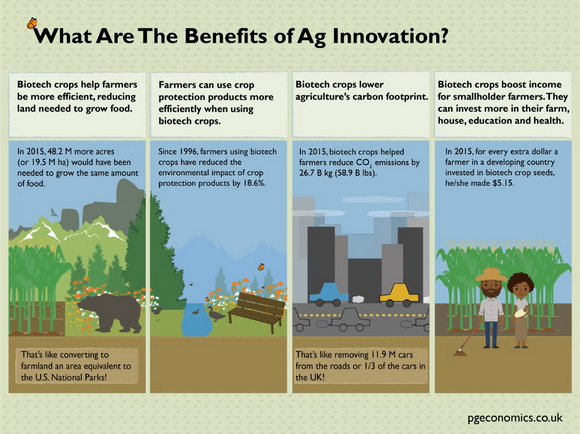
Report Shows 20 Years of Economic and Environmental Benefits from Biotech/GM Crops
June 7, 2017| |
Crop biotechnology has significantly reduced agriculture's environmental impact and stimulated economic growth over the last 20 years of use, according to the new report of PG Economics. The peer-reviewed report GM Crops: Global Socio-economic and Environmental impacts 1996-2015 authored by Graham Brookes and Peter Barfoot also presents the contribution of biotechnology in preserving the earth's natural resources while allowing farmers to grow more, high quality crops.
The report highlights that crop biotechnology has shown the following benefits:
- decreased agriculture's greenhouse gas emissions by using HT crops and reduced tillage, equivalent to removing 11.9 million cars off the road
- reduced crop protection spraying by 619 million kg
- contributed to food security and reduced pressure to use additional land to maintain production (additional land would be equivalent to 11% arable land in the US or 31% of arable land in Brazil or 13% of cropping area in China)
- enabled farmers to have improved crop yields, leading to additional 180.3 million tonnes of soybeans, 357.7 million tonnes of corn, 25.2 million tonnes of cotton lint, and 10.6 million tonnes of canola
- supported livelihoods of smallholder farmers in developing countries, reaching a net farm level economic of $15.5 billion in 2015 alone
- helped in attaining global economic success, with farmers in developing countries gaining $5.15 for each dollar invested in biotech crop seeds.

Download a copy of the report and read the press release for more details.
| |
Biotech Updates is a weekly newsletter of ISAAA, a not-for-profit organization. It is distributed for free to over 22,000 subscribers worldwide to inform them about the key developments in biosciences, especially in biotechnology. Your support will help us in our mission to feed the world with knowledge. You can help by donating as little as $10.
-
See more articles:
-
News from Around the World
- Report Shows 20 Years of Economic and Environmental Benefits from Biotech/GM Crops
- Public Learns about Biotech for Climate Smart Agriculture at World Environment Day Commemoration in Uganda
- Tanzanian Farmers Urge Gov't to Hasten Delivery of GE Crops
- Salk Scientists Help Plants Pump Iron Using Gene Variants
- Taking the Initial Step Towards Dev't of Epigenetically Modified Cotton
- Current Advances in Genome Editing Technology and its Application in Crop Improvement
- Australia's OGTR Receives License Application for Commercial Release of GM DHA Canola
- Australia's Gene Technology Regulator Shares Regulatory Practices with Vietnam
- India's National Academy of Agricultural Sciences Endorses Commercial Release of GM Mustard
- Scientists Discover Plant 'Brain' Controlling Seed Development
- EFSA Reiterates Previous Risk Assessment Conclusion on NK603 Valid and Applicable
-
Research Highlights
- SbNrat1 Gene in Sorghum Functions for Aluminum Tolerance
-
Announcements
- Biosafety in Plant Biotechnology Course
-
Plant
- Development of Gene-Specific Rice Mutants via AvrXa23-based TALENs
- Nagoya University Develops Highly Efficient CRISPR-Cas9 Vector for Arabidopsis
-
Read the latest: - Biotech Updates (January 21, 2026)
- Gene Editing Supplement (January 28, 2026)
- Gene Drive Supplement (February 22, 2023)
-
Subscribe to BU: - Share
- Tweet
